News
Sports Union sailing season 2024
Rory McKinna, University of Dundee Sport Scholar, writes about the outstanding sailing season in 2024
Published on 20 January 2025
Rory shares his journey and accomplishments in Parasailing competitions that took place in 2024.
2024 results
Hansa North Cup in France - 4th place
The 2024 season got off to a quick start, with the first competition scheduled just days after my university classes wrapped up. Last class on Tuesday, move home on Wednesday, drive to France Thursday, race for four days, drive home, sleep! This was the Hansa North Cup in France which I have never attended before as it is a doubles-only competition, but I knew I needed to grab opportunities in large fleets when I could, so this was a logical start. Kindly, the hosts, Club Ecole de Voile de Berk-sur-Mer, provided me with a Hansa that came with its own crew (Pascal Bellanger), so we were on! While neither of us spoke much of the other’s language, with enough gesticulation, anything can be communicated, and we got along well. The club is sited on the remains of a gravel pit, so conditions were like many of the TT regattas here in the UK, with fluky, shifty winds. I felt quite comfortable in this, despite the larger fleet, and Pascal and I managed to work our way to 4th place overall.
UK Hansa TT Series – 1st place
Next was the start of the Hansa UK TT series, where I got a slight jolt at the first regatta at Frampton Sailing Club. This year, the highly experienced para sailor Jazz Turner decided to have a bash at the Hansa circuit and give me a good run for my money. We had equal results in the first regatta (two firsts and two seconds), with Jazz having the final first place, thereby winning overall. This started what was to become a spooky trend where every regatta was won on countback, as our results were virtually identical, with Jazz always winning the last race. However, this did push me to sail as hard as I could, and I could feel my performance, along with the rest of the fleet, improving as the year went on. On a less technical note, I also changed my lunches from pasta to couscous and I’m convinced the resulting lack of carb slumps played a big role! Unfortunately, I had to miss a few TTs this year, as they overlapped with competitions abroad. Despite this, by September, I had secured the results needed to claim the overall win.
Belgian Sailability Cup – 1st place in singles and doubles
In May, I packed up my club boat ‘The Glasgow Bonnet’ and made my first big trip of the year with a return to the Belgian Sailability Cup, in Nieuwpoort, this time racing in both the singles and doubles classes. I was paired up with a friend from previous years, Sophie Dekeyzer and, as hoped, we got along well together on the water. The canal basin at Nieuwpoort is very pleasant place to sail, with a consistent breeze blowing off the North Sea and a complete absence of waves, which can be a battle in the heavy Hansas.
I have a great admiration for the way the Belgians run their short, sharp races. Aiming for the leader to finish at around 20 minutes prevents the race becoming a procession and means we can complete three races per session, rather than two. However, it does mean you have to stay on your toes, as there’s little chance of gaining a big lead. Sophie and I made sure we were in the lead position within the first leg, and we finished the competition first in the doubles, having gone undefeated across the three days. It was a similar story in the singles fleet and the extra time on the water with the doubles really paid off here as I was fully tuned in to with the wind. This convinced me of the benefits of sailing doubles and singles at the same competition and I would now aim to compete in both classes whenever possible.
French Hansa Nationals – 4th place
Following Belgium, the next competition on the trip was the French Nationals in Lorient. I had a few days between the two, so took a WW2 scenic route, stopping off in Dunkirk, Dieppe, Caen and the British Normandy Memorial. On arrival in Lorient, I did more than just look at WW2 history, as it turned out the Nationals were being run out of La Base, a series of monolithic concrete U-boat pens. It was definitely one of the more interesting places I’ve launched a Hansa! The fleet sizes were as impressive as ever, with around sixty Hansa 303s in both the singles and doubles classes, and the kaleidoscope of colours leaving the grey mass of La Base made for an impressive site.
The racing itself was held in the estuary, and we faced some difficult conditions across the four days, with low winds and roasting sunshine followed by apocalyptic rain. I had decided it was too hot to put on my gear that day, so decided to go sailing in my jeans and t-shirt. The first drop of rain fell as I stepped in the boat, and I was soaked to the bone before I left the marina! Thankfully though, the singles fleet got in a decent number of races, where I finished 4th overall.
UK Hansa Nationals – 1st place
The next event was the UK Hansa Nationals, held at the humbler venue of Whitefriars Sailing Club, Cirencester. Whitefriars is another flooded gravel pit, and the tight confines meant that, in the unusual wind direction we were experiencing, our first mark was forced into an awkward, shifty corner. Despite being only 30 meters from the start line, it was almost impossible to get there! This separated the fleet early on, meaning it was more of a straight race between the top sailors. Again, it looked like it was going to come down to countback between me and Jazz, but a good final day secured my place in 1st overall. Losing on countback would have been a sore one!
Italian Hansa Nationals – 3rd place
The week after the UK Nationals, I flew out to Venice for my first Italian Hansa Nationals. I wasn’t sure what to expect, as I had only met a few Italian sailors at international events. As it turns out, they have a well-developed domestic fleet and there proved to be a good number of boats. This regatta also marked the tenth anniversary of Hansa Class Italy, and they were determined to put on a good show. We were towed out to the edge of Venice every morning, where we had three days of good racing, with light but consistent winds. Upon return, there was free Prosecco and Aperol Spritz on tap. I don’t drink but it was funny to see anyway! On a technical note, the racing was a bit unusual. Normally, I stick to sailing up the middle of a course and avoid risking a wind shift leaving me stranded on the extremities of the race area. But on this occasion, sailing halfway across the lagoon and back in one tack was, without a doubt, the winning tactic! I waited a few races before trying it myself but upon watching the winner do this every race, I decided to join in. I finished 3rd overall and I’ll definitely be returning to the Italian Hansa Nationals.
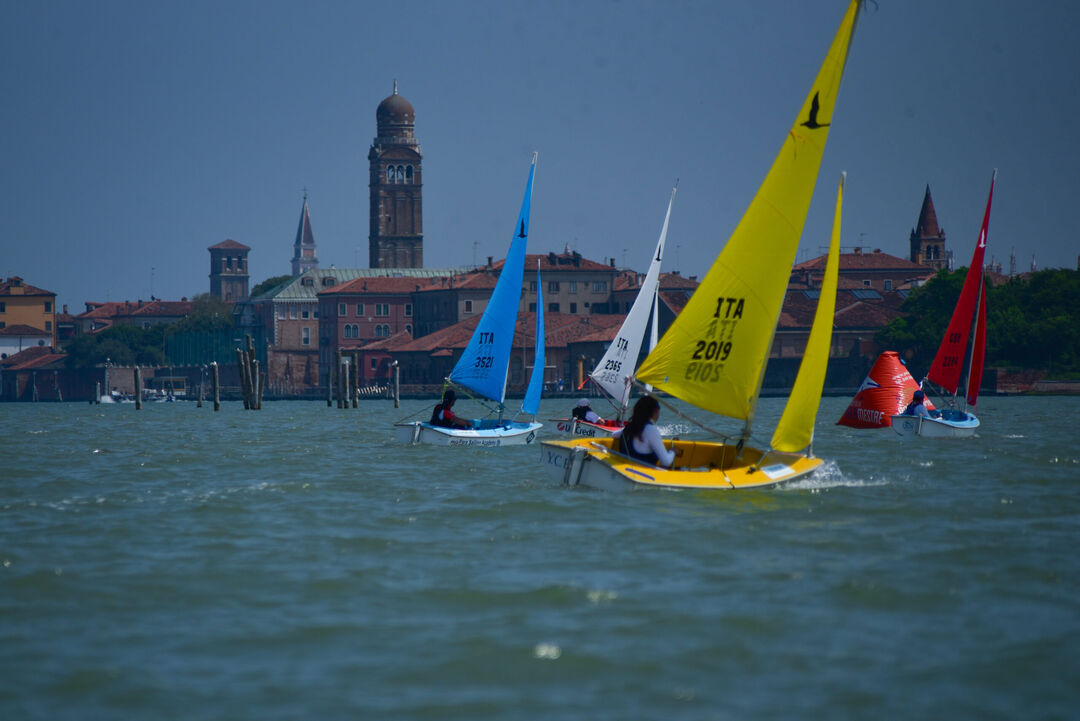
Italian Hansa Nationals
In amongst this busy season, I still found time to get involved at my club, Clyde Cruising Club (CCC). There was a start racing class that I took for a few weeks in the spring sessions and then in July, we were hosting our third sailability open day. Now more experienced and with a better grasp of what the day would involve, we had a healthy number of volunteers, including members of the instructor team, as well as Sailability Scotland members and staff from RYA Scotland present to lend a hand. This year, the sailability day was linked in with the Duncan’s Regatta, meaning participants were able to see Challenger trimarans racing, as well as having a go in the club’s Hansa 303s. The weather was ideal for a first sailing experience and all of those that attended had a great time.
Kakapo Open Race (Barcelona) – 2nd place
It was looking like it would be a quiet period from then until September, but a wild card was thrown in when it was announced that the Barcelona International Sailing Centre (BISC) would be running the new Kakapo Open Race, with support from the Americas Cup. This was a good opportunity for me to keep sharp through July and so I entered both singles and doubles classes.
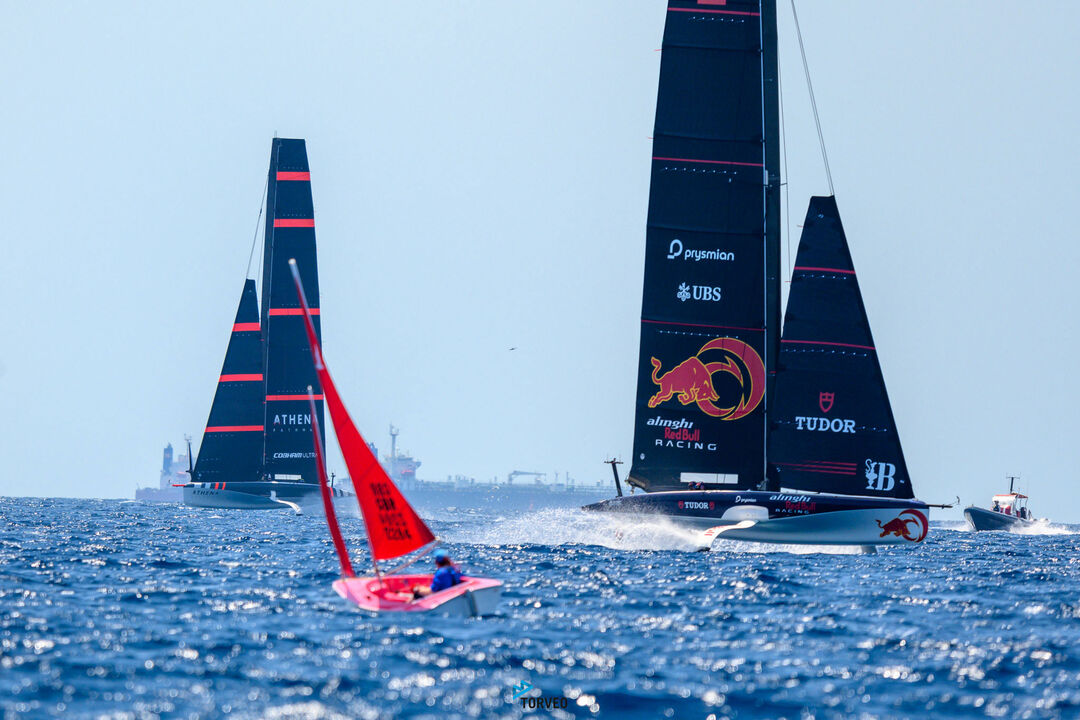
Kakapo Open Race in Barcelona with AC75 in the background
This time, I paired up with Luis Berastain from Majorca and again, despite the language barrier, we got along well. Barcelona proved to be a tricky place to sail, with the infamous two-directional waves making down-wind surfing almost impossible. Luckily, we had consistent winds for most of the competition which, every day, would slowly clock round to the right. If you caught on to this pattern, then making a race plan was easy. After three days of singles racing, I finished 2nd overall. Then, we moved on to doubles. This was a learning curve for me as, in the wavy conditions, the weight difference between myself and Luis became very noticeable. He was on the port side and was windward for most of the upwind legs but at the start line, when he was on the downwind side, the boat was noticeably sluggish, and we often couldn’t regain what we lost at that crucial stage. As they say, “a flat boat’s a fast boat”. Still, we did our best to hold our position, and we finished in the middle of the fleet. By far though, the highlight of the whole event was being on the same water as the Americas Cup teams, who often buzzed us by sailing/flying their AC 75s across our racecourse. It puts our Hansas into perspective! As part of its legacy, the Americas Cup will be funding the setup of a Sailability-specific sailing school at BISC, who hope to run the Kakapo next year as well.
Swiss Hansa Nationals – 4th place in singles and doubles
Come September and it was time for the big one. With The Glasgow Bonnet in tow, I set off on a three-week long trip of training and competitions. First stop was Weymouth, where Hansa Class UK had organised some training in preparation for the Hansa Europeans. Our instructor was Allan Hillman, a very knowledgeable sailor and wind surfer, who previously sailed a 303 with his daughter. They stopped because they got bored of winning everything, so naturally we were keen to learn their secrets! In our first de-brief, it was clear that his experience of sailing the 303 was going to come across in his advice and I’ve never seen our sailors so engaged with an instructor. I learned some very valuable lessons here, which I took with me across the Channel to my next stop, Switzerland.
The Swiss Hansa Nationals were held at Sailability Switzerland’s base in Arbon, on Lake Constance. This was a lovely venue, and I was eager to sail on the famed lake but unfortunately, an absence of wind made this almost impossible. Again, I was sailing doubles, and my crew on this occasion was Florian Burgi. Florian speaks excellent English, which was just as well, as there wasn’t much else to do! To add to our troubles, there was a great amount of weed around the shore, which we were dragging with us to the racecourse. We managed three “races” in the doubles fleet and one “race” in the singles. There’s nothing more frustrating than weed combined with wind and it was turning into one of the competitions where I say, “it’s the taking part that counts”! On the last day, the wind picked up a wee bit, with the final results being 4th in the doubles and 4th in the singles. One of the more interesting experiences at the competition was having a flyover from an airship! It was a little surreal to watch something so big fly out of an alpine valley and then hover above the racecourse.
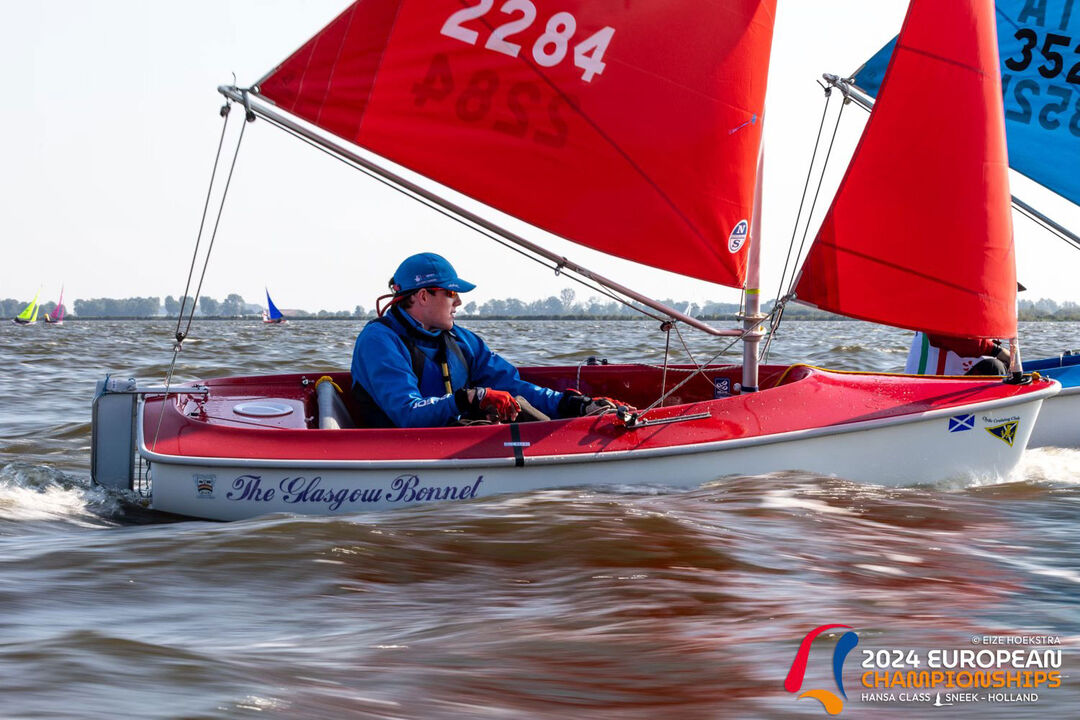
Hansa Europeans (Netherlands) – 4th (Singles), 5th (Doubles)
The final competition was what the year had been building up to, the Hansa European Championships in the Netherlands. Hosted on the Sneekermeer (Lake of Sneek) in Friesland, the Dutch lived up to their reputation for organisation, good planning and always ready for a party. The whole competition was just the right balance of serious, well managed racing and friendly socials. It was doubles and singles again and, keeping up the international theme, my crew this time was Mattias Kieser from Lichtenstein. We sailed together last year at the Swiss Nationals and decided that we got along so well we should give it another shot. Mattias speaks good English and, importantly, is a similar weight to me. This made such a difference in the racing and after a baptism of fire on a bluster first day, we were consistently at the pointy end of the fleet. The level of competition at this Europeans was noticeably high and it’s great to see so much of the fleet improving. In the singles fleet, I had good results, but a couple of bad races, one at the start and one at the end, scuppered my chances of a podium position. The overall winner and runner up, were a good half a leg ahead on most races, battling it out between themselves. My nearest competitor was the nimble German, Jens Kroker, but he managed to stay just out of reach. I finished in 4th overall which was a slight disappointment but the men on the podium were definitely the better sailors (on this occasion)! In the doubles, myself and Mattias only got better as the week went on and we finished 5th overall, which we were delighted with.
UK Challenger Champs – 8th place
Two days after returning to Scotland I headed back down to England along with fellow CCC member, Chi Chian Wu, for two competitions at Rutland Water.
First was the UK Challenger Championships, where we raced individually. Strong winds combined with an awkward direction prevented launching on the first day of racing, but it gave time to get some University work done. Racing started in earnest on day two but the wind, now on the light side, was proving tricky to predict and the old hands of the class were gone long before I could figure out what was happening! Being trimarans, the Challengers aren’t the nimblest and if you couldn’t predict the wind, you could spend a lot of time tacking. On top of that, I just wasn’t feeling the boat. I was on the last day when, out of frustration, I released the main sheet and controlled the sail by holding directly onto the boom. Instantly, things felt better! I thought the old ratchet pully for the main was taking the feel out of the sheet. So, before the next race, I had a poke (either unlocking or breaking the pully) and sailed the last race with it spinning freely. This made a huge difference. If only I had noticed sooner. Sadly though, Chi Chian and I had a fall from grace, finishing 6th and 8th respectively.
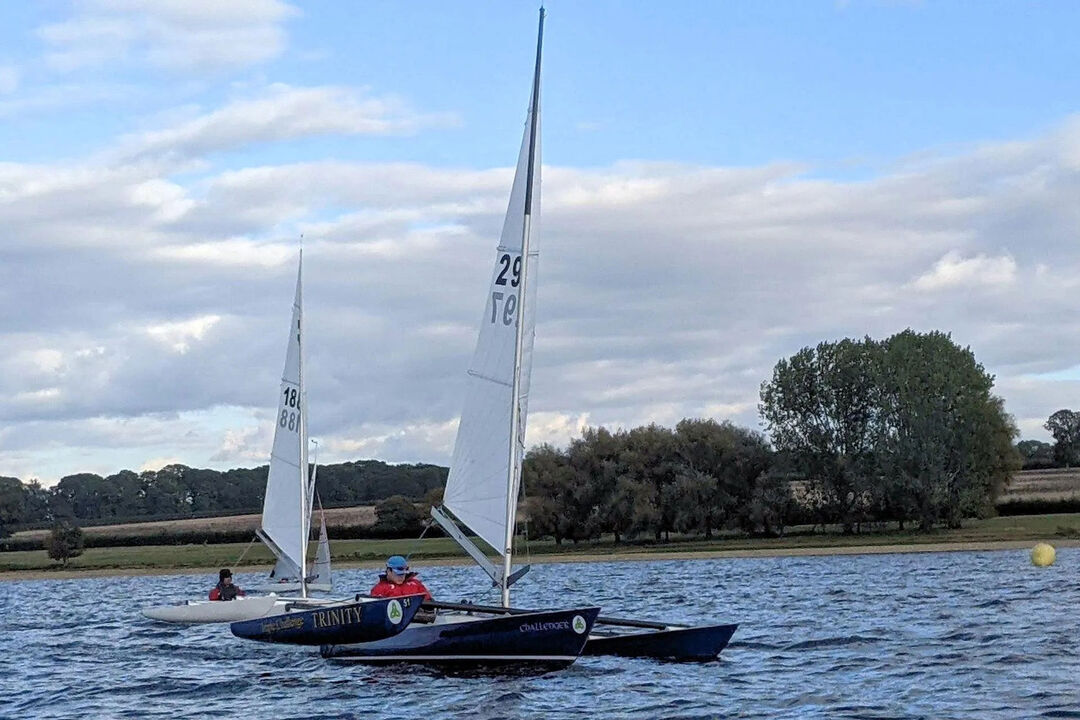
UK Challenger Nationals
RS Venture Connect Worlds (UK) – 4th (Overall), 2nd (Para)
However, there was no time to grieve, as no sooner had we packed the Challengers away, we paired up and were back on the water in the practice racing of the RS Venture Connect (RSVC) World Championships! Already planning on being at Rutland, we thought it made sense to team up for the RSVC Worlds, despite our lack of experience in the boat. We had managed one training session earlier in the year, but we came away feeling pretty confident about our abilities. Chi Chian brought technical boat experience and I brought strategy. So, when it came to the practice race, we confidently collided with the Spanish boat while trying to duck them, locking mast head floats in the process. Both parties stared silently at each other before we drifted apart and continued the race. Chi Chian looked rather pale afterwards but luckily there was no damage done and we quickly got over the incident (there were limited witnesses). However, come the racing, we were back in the game and had some good results. The wind was strong enough that there was a spinnaker ban and mandatory reefed sails on two of the days, so in our mind, this turned the boat into a big Hansa! We had some excellent last leg battles, particularly with French, and the teams often came away smiling, whether they had finished first or not. It was bitterly cold and wet for two of the days. When I asked the other nations what they thought about it, they said it was typical British weather, so they weren’t surprised at all! In the end, we came away with silver in the Para class and sat 4th in the overall results, dead chuffed for our first time racing together.
Barcelona Para Sailing Regatta (Italy) – 1st place
However, the season didn’t end there, as there was a last-minute addition to my calendar. 2024 was the second time the Barcelona Regatta in Trieste, Italy, ran its Para Sailing Regatta and having missed it last year, I wanted to see what it was all about. Backed by World Sailing, this event is as much a demonstration and presence at the famous sailing city, but there is still a healthy dose of competition involved. The two-day regatta began with an absence of wind on the first. However, we managed three races on the second day and oh boy were they good. We had the full range of conditions; sun and rain, perfect, then light, then strong winds, so each race brought a different challenge. The fleet stayed tight and there was always a group of about seven boats still battling for first place on the last leg of each race. It could have gone to any of us. In the end, I finished 1st overall and certain I will be back next year.
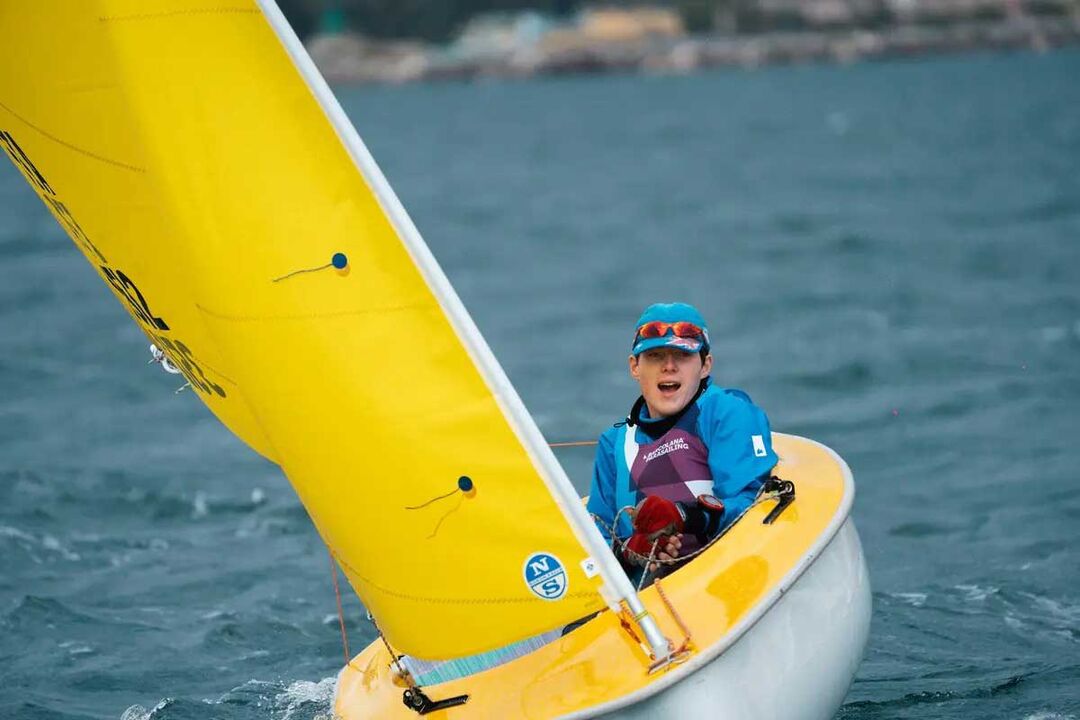
Barcelona Para Sailing Regatta
Navicap Challenge - Elena Sivoldaeva Trophy (Monaco) – 12th place
Finally, rounding off the year in style, I paired up with Charlotte Jones and headed to Monaco for the Navicap Challenge - Elena Sivoldaeva Trophy. I attended the first Trophy last year and it was a great event to end the European sailing season. Word must have spread as this year, entries nearly doubled to just over 50 pairs from five nations! Unfortunately, while the sun shone brightly, the wind was less cooperative, with extremely light breezes on the first two days. Charlotte and I found this hard going, especially since we had never sailed together before. However, everyone had a boost on Saturday night with another excellent social organised by Yacht Club de Monaco (the conga line was at least 40 meters long)! By Monday morning, the wind had picked up and the event ended with perfect racing conditions. We finished 12th overall, which we agreed wasn’t bad for a first time sailing together.
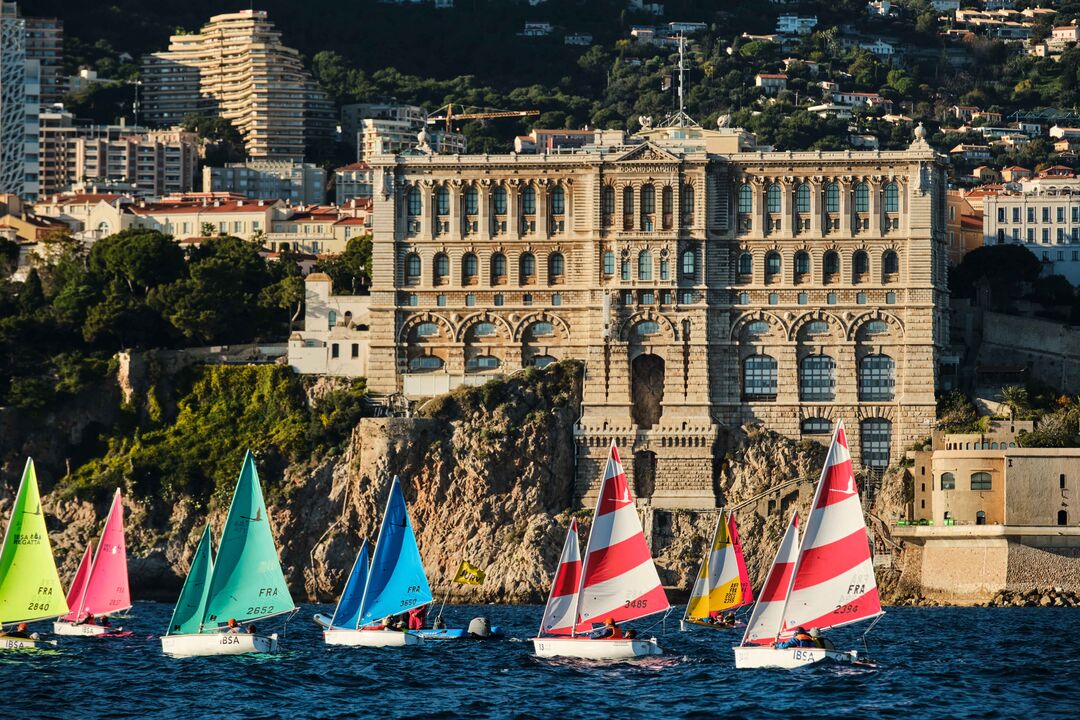
Navicap Challenge in Monaco
That’s pretty much everything that’s happened this year. Looking forward, I intend to get on the water as much as possible over the winter and stay sharp for the next big event, the Hansa Worlds in Australia, in March! 2024 was my busiest year so far and the support I have received from the University of Dundee Sport Scholarship Programme has helped immeasurably in what I’ve been able to achieve. Roll on 2025!